“What will happen to the kids when I’m gone?”
It’s every mother’s fear.
Even when our kids reach adulthood, many of us stay deeply involved—texting reminders, offering advice, praying silent prayers over their lives.
My case is a bit different.
I have three amazing adult children. Two are living with their partners, working, creating, and building worthwhile lives.
And then there’s Allen.
If you’re new here—welcome—and let me tell you a little about him. Allen is 39, but emotionally, he’s still figuring things out, stuck somewhere in his twenties as he tries to make sense of a world that often confuses him. He thrives on the safety of our little brick row house and the routine we’ve built.
He loves robots, computers, and video games.
When his father passed away almost six years ago, Allen struggled deeply. His grief was different than his siblings’ , but no less real.
That’s what happens when you live on the autism spectrum.
This past Sunday, as the five of them—my three kids, plus two beloved spouses—gathered for Mother’s Day, I sat back and watched them.
They were laughing, teasing, cooking, cleaning, chasing snacks from the fridge.
And I thought:
They’re going to be okay without me.
Here’s why.
1. They “Get” Each Other
While my three kids share the same striking blue eyes, they’re vastly different in personality. Dennis is the creative artist. Bonnie, the nurturing teacher. Allen, the quirky little brother.
And still—it works.
They chatter about movies, play Mario Karts, and devour everything in sight like they’re still teenagers.
2. They “Like” Each Other
Sure, siblings are supposed to love each other. But mine actually like each other.
They still joke like kids. They still sing the “Harry’s Savoy Grill Song” until their spouses roll their eyes. They still debate things like the shades of peanut butter with ridiculous enthusiasm.
“They still sing the Harry’s Savoy Grill Song until their spouses roll their eyes.”
3. They Are Resilient
Each of them has faced something hard—physical setbacks, emotional pain, financial struggle.
But they keep getting back up. They’ve been through storms and come out stronger, wiser, and maybe just a bit feistier
.
4. They Know Heartbreak
I wouldn’t have wished it on them, but their dad’s long illness and sudden death shook all of us.
They each grieved differently. Allen’s journey was more winding, and more complex. But Dennis and Bonnie never questioned his need to “find Dad” in his own way.
They just walked beside him.
5. They Are Kind
Their father, Ron—our Gentle Giant—passed down his heart.
They notice who’s hurting. They ask thoughtful questions. They show up when it matters.
6. They Are Tough
Ron was gentle. I was tough.
Nineteen years of spousal caregiving taught me that nothing could knock me down.
That spirit lives in them. They don’t back away from challenges. They don’t fold under pressure.
They get going.
7. They’re Creative Problem Solvers
Money was tight for years. But the kids found joy anyway.
Dennis made Star Wars models from shoeboxes and sticks. Bonnie sewed Barbie dresses from scraps. Allen built entire structures from plastic water bottles.
They don’t wait for perfect conditions.
They create something out of nothing
.
8. They’re Educated (In Every Way)
Sure, they have degrees. But more importantly, they’ve been schooled by life.
They know it’s not fair. They know how to sit with grief. They know how to keep going.
And they do.
9. They Choose Good People
Dennis and Bonnie picked life partners who support them beautifully.
Laura knows how to ground Dennis when anxiety strikes. Jared knows how to hold Bonnie’s whirlwind spirit gently.
Allen doesn’t have a partner right now—but Jared and Laura show up for him, too
.
10. They Are the Best of Ron and Me
Ron and I didn’t have a lot in common—except for our faith.
He liked sports. I liked books.
He was spontaneous. I planned everything.
He gave freely. I budgeted wisely.
But somewhere in that messy, beautiful mix, we created three incredible people.
Full Circle
So yes, the fear still creeps in.
What will happen when I’m not here?
But when I see them all together—laughing, teasing, supporting, just being—I know the answer.
They’ll be okay.
Even when life isn’t.
Even when they’re not okay for a little while.
“Even when they’re not okay for a little while—they’ll be okay.”
They’ll sing silly songs.
Debate peanut butter colors.
Check in with each other.
Carry forward the love that made them.
And that’s more than enough.
If this reflection spoke to you—whether you’re a mom, a sibling, or someone finding your way through the hard and beautiful parts of family—share it with someone who needs a little reassurance today.
Because sometimes, knowing we’ll be okay is the greatest gift we can give each other.











So true, Debbie. Thanks for joining us here!
Thank you for this reassurance. Once a Mom, always a Mom!